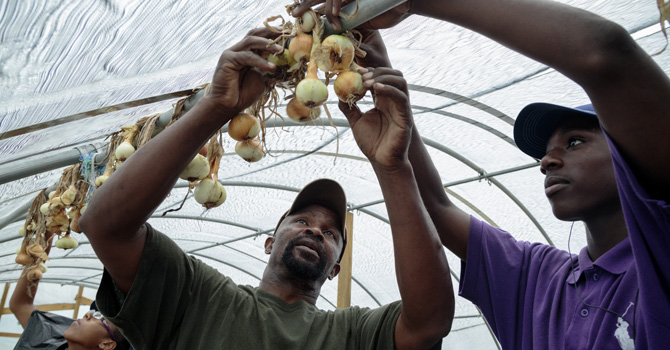In conversations with people across North Carolina, I’ve noticed that people speak about rural communities in one of two ways.
The first is in idyllic terms, with rural communities romanticized as relaxed, simple and honest places. The second often comes from a place of pity: rural life is seen only as a world of lagging economies, failing school systems and poor access to health care.
The truth is, our rural communities do face deep challenges. In my job as the rural church fellow at the Institute for Emerging Issues at North Carolina State University, I spend most of my workweek driving from rural community to rural community, and it’s not hard to spot the many problems. Our rural communities are in decline, young adults are moving away, and rural economies and demographics are in a state of transition.
But it is also true that these same communities are places with deep and bountiful assets. I work with churches to increase civic engagement in their communities. I’ve found that if we can tap the right people for the conversation and identify the unique gifts of these communities, then innovative solutions have a way of popping up.
As a member of the clergy, I believe that one of the biggest assets of rural communities is the church. Despite the issues that rural churches -- and the rest of mainline Protestantism -- face, they are some of the only viable institutions in these communities.
More importantly, they are trusted institutions. According to the North Carolina Civic Health Index, people in North Carolina are more likely to volunteer in the church than in other organizations. Churches are places where people from across job sectors, with varying backgrounds and opinions, all come together for the common purpose of serving Christ.
This presents an amazing opportunity for the rural church to engage and strengthen the wider community, which in turn strengthens the church.
One example I’ve encountered is Cullowhee United Methodist Church, a partner church in the Thriving Rural Communities Initiative. It sits on the side of a mountain in Jackson County, where 20 percent of the 40,000 people live in poverty. Though it likely will never be a megachurch, Cullowhee UMC is viable, with two morning services and an average worship attendance of just over 260.
Read about another exciting rural ministry in North Carolina.
The Rev. David Reeves, the senior pastor, is not one to dole out leadership advice. In one of my earliest conversations with him, I asked what made Cullowhee such a good church. With a grin, he said, “I don’t know. You just sort of have to show up. Just be there and listen.”
So I did. And I’d like to share what I saw and heard that make this congregation a model for leadership.
The church notices the world around it. I believe the unique strength of Cullowhee UMC comes from its commitment to the wider community.
In just about every description of a program, I read the same introduction: “We noticed that …” These programs, ranging from ESL classes to peer networks for at-risk youth, were not designed just to give people something to do but rather to respond to a need in the community. And the church first had to notice what the needs are.

The church starts small. Community engagement does not have to be complicated, flashy or expensive. Some of the programs with the most impact start as simple efforts to engage a specific issue.
Part of Cullowhee’s strength is its proximity to Western Carolina University. The church has cultivated a relationship with the university, hosting the Wesley Foundation, providing a place for college students to volunteer and make Cullowhee UMC their church home.
Another simple effort is providing firewood to people who need heat. The congregation collects and chops firewood and delivers it to homes across the community. These small actions ripple outward: a warmer home offers a better night’s sleep, which provides the possibility of better performance in school or on the job.
The church fosters an attitude of community outreach. The Rev. Julia Trantham, the deacon associate minister of education and spiritual development at Cullowhee UMC, explains: “We draw people into the church by including them in some important work that makes a difference. No one comes in asking for a Bible study. They want to know how they can help first.” The Bible studies, she added, come later.
This isn’t just an attitude in the leadership, however. At a meeting I attended with three lay members, Reeves posed the question, “How do we make the church more welcoming?”
The initial answers were as expected: follow up when people visit; make sure to welcome people at worship. But then the conversation took a turn I was not expecting. One layperson said, “We also need to be caring about the whole community. We can’t just be concerned with how we are on Sunday mornings.” The church, these members insisted, should be a place where people in the community can find resources when they face a difficult situation.
The result of this attitude is a culture of engagement. Trantham estimates that in the course of a year, the church’s programs have almost 300 volunteers. Most volunteers are from the church, but others are introduced to the church through volunteering. Community outreach becomes evangelism and spiritual formation, a way of understanding the theology expressed on Sunday mornings.
Strong, vital churches are not just churches with high attendance numbers and lots of programs. Vital churches are churches that take their incarnational mission seriously. Bearing witness to the transformative work of Christ in their own lives, they seek to be the transformational presence in the community around them. They point to the reality of the kingdom of God at hand, and actively work to make it known.
Our rural churches are uniquely positioned to be leaders in their communities. They are trusted institutions that can play a pivotal role in the development of their culture and society.
When we take that charge seriously, I suspect that we will see a more viable -- and a more vital -- model of church emerge, with new efforts continuously engaging the enormous challenges in our community and shaping the world in the name of Christ.














